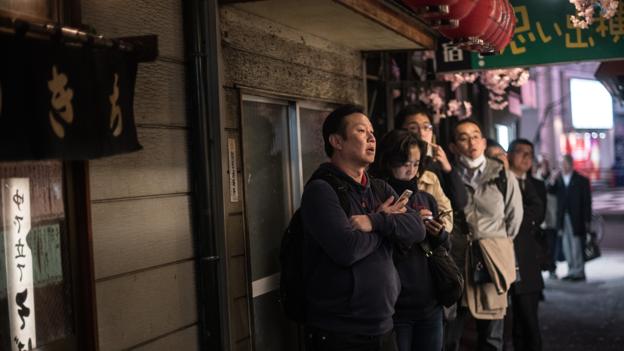Many people would approach these situations by blowing up, shouting obscenities and devoting all their energy to finding a way out of the situation. But in Japan, it might be more likely to be met by a ubiquitous phrase with a different meaning: shou ga nai.
This phrase, or a more formal variant, shikata ga nai, is often used in common situations that are generally negative but leave you no alternative but to get over it. Its loose English translation is “it can’t be helped”.
Rochelle Kopp, a consultant who helps Japanese and non-Japanese companies communicate better, has dealt with the phrase plenty of times.
When working with Japanese companies, “someone I have been working with will be rotated at short notice, often with very poor timing,” she says. The response? Shou ga nai. “I realise that my likelihood of ever changing it is the same as the likelihood of my stopping the earth turning.”
In such situations, she feels that “from my American cultural perspective, it sounded like people were giving up just when I thought that they should be putting up a fight."
But this phrase isn’t a cultural concept unique to Japan. Rather, it expresses a universal sentiment, says Miyako Inoue, an associate professor of anthropology at Stanford University.
“In everyday life in America, for example, I hear people expressing the same sentiment… ‘What is done is done,’, ‘Let it go and move on,’,” she says.
This phrase – and the sentiment behind it – raises some interesting questions. Is there something useful about the meaning of phrases like shou ga nai? Is there anything freeing about accepting frustrating situations, rather than trying to constantly fight them?
A universal concept?
There are phrases similar to shou ga nai in cultures across the world. In English, for example, we have “It is what it is”. “C’est la vie” is somewhat similar in French. Iceland’s “þetta reddast” (which loosely translates to “it’ll all work out”), too, is in a similar vein.
Each can have unique nuances and contexts within their cultures. But one thing they have a bit in common is the feeling of resignation – knowing when to accept fate rather than struggle against the status quo.
Some studies show that accepting bad things that happen can help reduce anxiety, though. For example, a 2017 study from the University of Toronto and the University of California, Berkeley “found that people who habitually accept their negative emotions experience fewer negative emotions, which adds up to better psychological health”.
Accepting a bad situation is the sort of “cognitive reframing” that can be beneficial, says Iris Mauss, associate professor of psychology who worked on the Berkeley study.
“If you’re good at thinking of those [stressful daily] events in a way that minimises their emotional impact on average, you do better in terms of your wellbeing,” she says. When you learn to let go, “you feel more at peace, and you put your resources and efforts into changing situations that you can actually change.”
Fighting frustration
It might be worth stepping back in frustrating situations and asking yourself: what am I actually getting stressed about? Can I change it? If I can’t – why is it worth getting stressed over in the first place? And could this be an effective strategy to deal with frustration?
The experts say it depends on the situation.
If it’s a one-off event with little consequence, then it’s a good strategy. But “when it’s a systemic problem – like you have a terrible boss that yells at you and demeans you, or a relationship partner who is abusive – these are cases where you maybe need to find a way to eliminate the structural problem,” says Stephanie Preston, a psychology professor at the University of Michigan.
The sentiment in these fatalistic phrases might be similar to a phenomenon called social defeat, she says. It’s often explored with experiments in mice. A small mouse is put in a cage with larger, more aggressive mice, and the smaller mouse acquires an almost learned helplessness. After a territorial, maybe violent confrontation with the bigger mice, the smaller mouse often shows depression-like behaviour, resigning itself to the apparent social order in the cage.
The good news is that humans can in many cases take action to get out of a systemically bad situation: quitting a toxic job, or leaving a toxic partner.
Still, it’s all about context. Some systemic situations might call for resistance and change – Preston points out this is how big social revolutions can start – but what about the more day-to-day stuff, like a slow-moving traffic jam? Sometimes it’s just better to shrug and say something like “shou ga nai”.
“People use those coping mechanisms [because] it’s easier than holding on and trying hard in stressful situations,” says Sachi Inoue, a psychoanalyst who runs a private practice in Berkeley and is a director of an adult outpatient clinic in San Francisco. “A sense of resignation also leads into some deeper understanding of yourself, and knowing your limits: a unique human ability, and that’s very important to maintaining feeling OK.” That’s why a phrase like “shou ga nai” can be used in both bad and good ways, she says.
Writing for GaijinPot, a popular site geared toward expats in Japan, Japanese language teacher Yumi Nakata addresses the “beauty and burden” of the phrase. She talks about seeing her salaryman father come home after long working hours and then using the phrase, but as she’s grown older her perspective shifted.
“Although there are many things that we cannot control, we are in control of our responses,” she writes. “I used to reject the ‘shikata ga nai’ attitude entirely, but now I do embrace it and say this to simply control my natural responses to the unfairness/discomfort of life itself.”
Something to keep in mind the next time you’re in an especially frustrating and slow-moving queue.
BBC
More about: frustration
















































